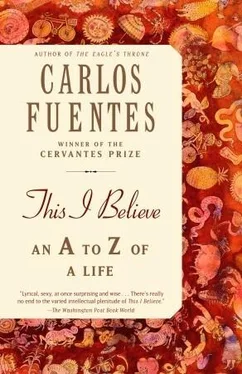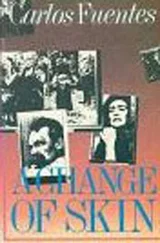There is no novel without history. But the novel, by introducing us to history, also allows us to search the nonhistorical path so that we may contemplate history in a clearer light, so that we may be authentically historical. To become so immersed in history that we lose our way in its labyrinths, unable to find our way out, is to become a victim of history.
Insertion of the historical being into history. Insertion of one civilization into others. This will require a keen conscience on the part of our own tradition if our goal is to extend a welcoming hand to the traditions of others. What unites all tradition if not the need for building a new creation upon it?
This is the question that new Mexican novelists like Jorge Volpi, Ignacio Padilla, and Pedro Ángel Palou resolve so brilliantly.
All novels, like all works of art, are composed simultaneously of both isolated and continuous instants. The instant is the epiphany that, with luck, every novel captures and liberates. As Joyce puts it in A Portrait of the Artist as a Young Man, they are delicate, fugitive moments, “lightnings of intuition” that strike “in the midst of common lives.”
But they also strike us in the middle of a continuous historical event, so continuous that it has neither beginning nor ending, neither theological origin nor happy ending nor apocalyptic finale, just a declaration of the interminable multiplication of meaning that opposes the consoling unity of one single, orthodox reading of the world. “History and happiness rarely coincide,” wrote Nietzsche. The novel is proof of this, and in Latin America we gain the novel of mindful warning when we lose the discourse of hope.
New novel: I speak of a still tentative but perhaps necessary step, from identity to “alternity”; from reduction to enlargement; from expulsion to inclusion; from paralysis to movement; from unity to difference; from noncontradiction to perpetual contradiction; from oblivion to memory; from the inert past to the living past; from faith in progress to criticism of the future.
These are the rhythms, the meanings of newness in narrative. . perhaps. But only with them, with all the works that liberate them, can we attain the magnificent potential for creating images that José Lezama Lima bestowed upon the “imaginary eras.” Because if a culture is not able to create an imagination, the result will be historically indecipherable, adds the author of Paradiso.
The novelty of the novel tells us that humanity does not live in an icy abstraction of the separate, but in the warm pulse of an infernal variety that tells us: we have yet to be. We are in the process of becoming.
That voice questions us, arriving from far away but also from very deep within us. It is the voice of our own humanity revealed in the forgotten boundaries of the conscience. And it hails from multiple times and distant spaces. But it creates — with us, for us — a space where we can gather together and share our stories with one another.
Imagination and language, memory and desire — they are not only the living matter of the novel but the meeting place for our unfinished humanity as well. Literature teaches us that the greatest values of all are those that we share with others. We Latin American novelists share Italo Calvino’s sentiments when he declares that literature is a model of values, capable of proposing stages of language, vision, imagination, and correlation of events. We see ourselves in William Gass when he shows us that the body and the soul of a novel are its language and imagination, not its good intentions: the conscience that the novel alters, not the conscience that the novel comforts. We identify with our great friend Milan Kundera when he reminds us that the novel is a perpetual redefinition of the human being as problem.
All of this implies that the novel must formulate itself as a constant conflict of all that has yet to be revealed, as a remembrance of all that has been forgotten, the voice of silence and wings of desire of all that has been overcome by injustice, indifference, prejudice, ignorance, hatred, and fear.
To achieve this, we must look at ourselves and the world around us as unfinished projects, permanently incomplete personalities, voices that have not yet uttered their last word. To achieve this, we must tirelessly articulate a tradition and uphold the possibility that we are men and women who not only exist in history but make history. As Kundera suggests, a world in the midst of rapid transformation invites us constantly to redefine ourselves as problematic, perhaps even enigmatic beings, never as the bearers of dogmatic answers or conclusive realities. Isn’t this what best describes the novel? Politics can be dogmatic. The novel can only be enigmatic.
The novel earns the right to criticize the world by proving, firstly, its ability to criticize itself. The novel’s criticism of the novel is what reveals the labor that goes into this art as well as the social dimension of the work. James Joyce in Ulysses and Julio Cortázar in Rayuela ( Hopscotch ) are prime examples of what I am trying to say: the novel as a criticism of itself and the manner in which it unfolds. But this is the legacy of Cervantes and the novelists of La Mancha.
The novel proposes the possibility of a verbal vision of reality that is no less real than history itself. The novel always heralds a new world, an imminent world. Because the novelist knows that after the terrible, dogmatic violence of the twentieth century, history has become a possibility; never again can it be a certainty. We think we know the world. Now, we must imagine it.
Language is the creation of time. And time, in the language of myth, is the eternal present. It is language that expresses the aspiration of being one, complete, as in the beginning: before the first sacrifice, before the first murder, before the first rape, before the first testimony of death. Everything in the cultures of the dawn is remembrance, a representation of the privileged instant before separation. Time and again, myths have attempted to illustrate this yearning for a return to that first age, that “Golden Age.” The purpose of the eternal present — the myth — is to relink us (through religion) to the natural world at the moment it becomes the human world.
From Vico to Lévi-Strauss, myth and language are identified as one: the paradox that an animal sound (the “moo” of a cow) gives rise to both the word that it is ( mitos, word) as well as the word that it isn’t ( mutus, mute). Myths are like a glass wall between the two dimensions of language. To say or not to say. To return or not to return. And while the nostalgia of language may consist of offering us a reversible structure that brings us back to the primary unit of man, the inevitability of language is that it depends upon a successive and irreversible medium: the word. The dilemma of language is right there in its very origins: how can we employ a fragmented and sequential medium to create the impression of immediate, complete presence? This is the dilemma of the first shaman, María Sabina, who is every shaman, and the last one, James Joyce, who is every writer.
History is the privileged locus of chronological time. From there emerges its fraternal parallel with the successive destiny of discourse. Each step forward taken by history and its servant, which is the word (because history is only that which survives, that which speaks or writes of history), takes us one step further away from our origins. The so-called “primitive cultures” (which are not in fact primitive, just different) reject this accelerating impulse of history. The life and passion of Christ occur, as far as Western culture is concerned, between two very specific historical moments: the reigns of Augustus and Tiberius. Transposed onto the culture of the Cora Indians of Nayarit, Mexico, Holy Week does not celebrate the sacrifice of a historical God, Jesus, but rather the sacrifice of the original God who at the dawn of time spilled His blood so that the corn could grow. The price of the communitarian unity of mythical worlds is called isolation. The price of the individual translation of myth is called freedom, and freedom means fallibility.
Читать дальше












